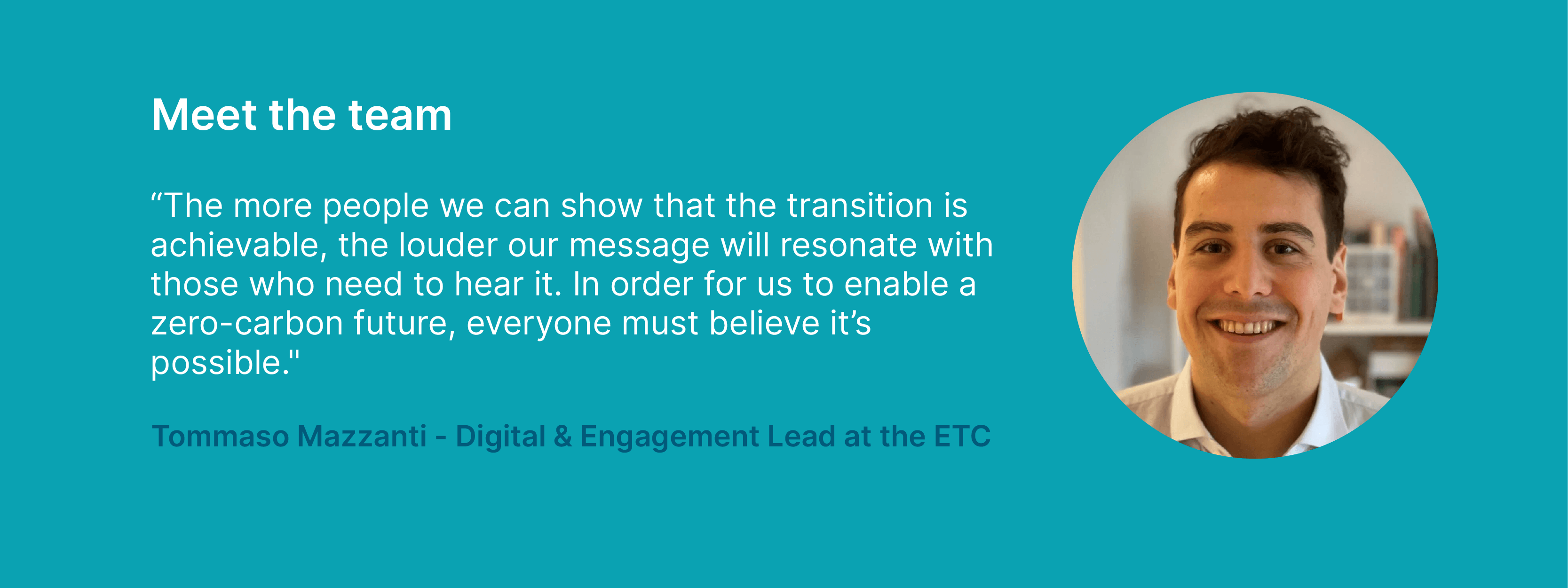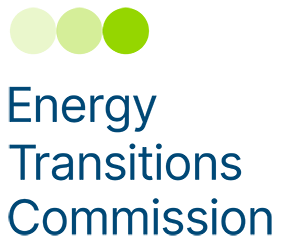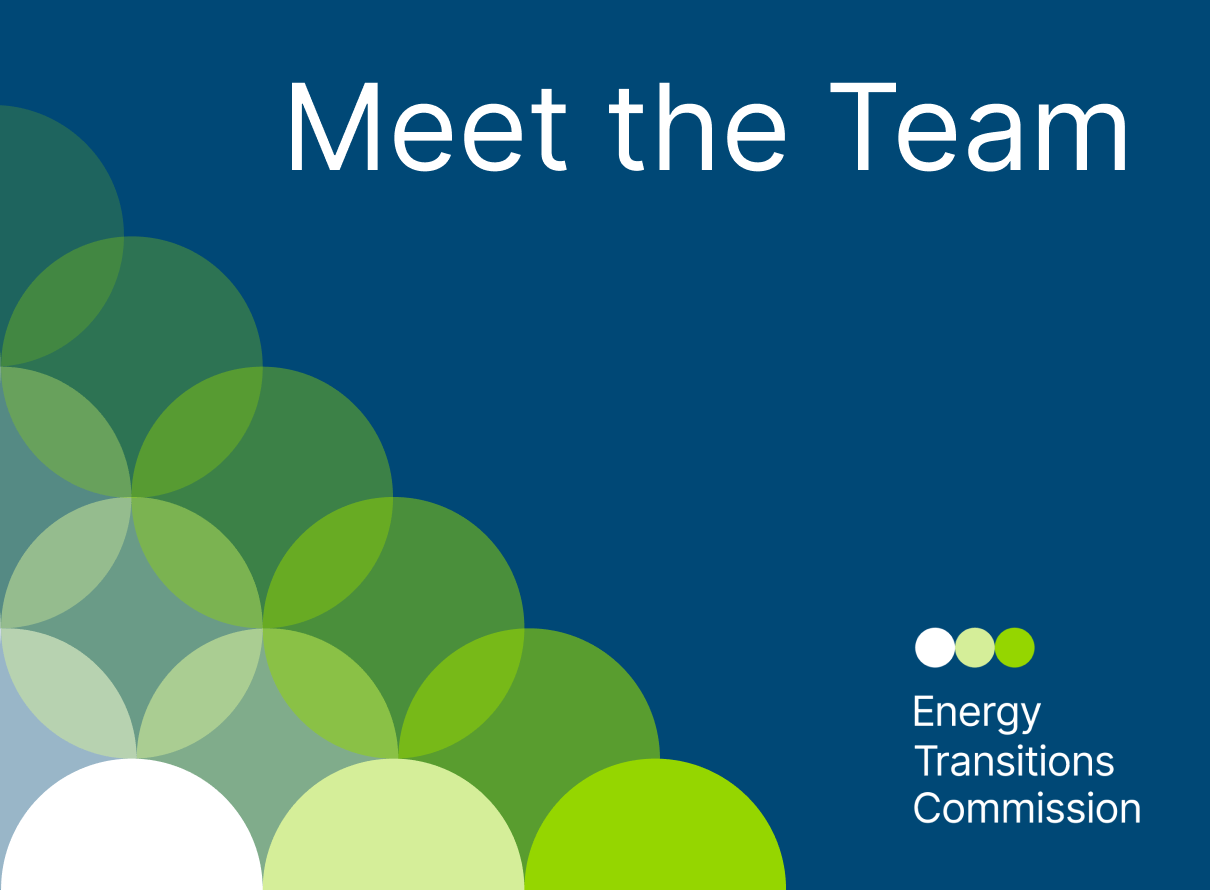Today we introduce Tommaso Mazzanti, Digital and Engagement Lead at the Energy Transitions Commission.

What made you join the ETC?
I had been working in journalism for about five years and questions about climate change kept coming up more and more. I was really interested in it but I realised, especially on the reporting side, we were talking a lot about the horrible devastation that it was causing and not so much about what can be done tangibly to avoid it.
I wanted to learn about the global solutions to the climate crisis. What struck me about the ETC was both the wide-ranging coverage of expertise, from electrification to carbon capture, hydrogen and many more… and specifically the positive outlook it had. It all started from the ‘bible’ that is Making Mission Possible, this idea that a zero-carbon economy is achievable and we can continue to live mostly as we have been, but evolving where we get our energy from and how we apply it.
What’s your proudest achievement to date at the ETC?
My first attendance at COP, which was COP26 in Glasgow, comes to mind. I was extremely proud when the ETC was asked to do the week one stock take and looked at the numbers and the agreements that had been made so far and how that translated into potential emissions reductions. Our Chair, Adair Turner, presented these at an official event and the attention that resulted in was very impressive and it was an extremely proud moment.
On a more personal level, I’m proud of the growth that we’ve had on social media. Not just in terms of numbers, but the spike in engagement that we’ve seen. That’s apparent in our conversations and also how much bigger our teams are compared to when I started three years ago. People are engaging more with the question of the energy transition. We see that both from comments and likes, but also from mentions and reshares of our analysis and of our colleagues work.
What does the energy transition mean to you?
The energy transition to me is a solution. I see it as a way for everyone across society to live the lives that they wish for. Buying new cars, moving into new houses, going on holiday, but doing it in a way where the world isn’t crumbling around us.
It’s a matter of responsibility and efficiency. You don’t necessarily have to give up everything, but it’s about reducing where you can. It’s about being aware of what you’re consuming and producing, and making the changes where you can be most impactful.
Take the question of meat, for example. It’s not necessarily about cutting it out completely, but even a decrease of certain proteins is hugely helpful. The same is true for how you travel, what you wear and how you heat your home. And that should be the same for the very fabric of our economy: how do we keep growing, but in a more responsible way.
On the pathway to net zero, what do you see as the biggest obstacle?
I think the biggest obstacle towards net-zero is political will. And I know that this answer has come up before to this question, but I think it’s true!
What we have seen at the ETC is that corporates and organisations are willing to make the changes if they get the right incentives, support and assurances from policy.
In everyday conversations, with Systemiq colleagues but also when you’re at the pub with a friend, it’s clear that most people in society are happy to make necessary changes.
I think the one bit that’s missing is the political will and that unlocks everything else. So unfortunately it’s the most important bit, but it’s also the last hurdle. The last piece of the puzzle for change to happen at the required pace.
What are you most excited about that’s coming up at the ETC?
I am most excited about reaching out to individuals and really making sure our messages are landing. I think engaging directly with decision makers, be it in policy or industry, and illustrating our numbers and discussing our analysis is key. As I was saying, the political will is the last piece of the puzzle, so that’s who we really need to be convincing.
I’m also looking forward to putting out more video content and engaging the wider public in our analysis in a digestible and enjoyable way. The more people we can show that the transition is achievable, the louder our message will resonate with those who need to hear it. In order for us to enable a zero-carbon future, everyone must believe it’s possible.
What’s the best piece of advice that you received from an ETC colleague?
When I first joined the ETC I found myself questioning how the energy transition is completely achievable. Yes, our analysis showed and shows it’s technically and economically possible, but practically each industry or individual can only go so far. It needs to be a concerted effort.
Talking with our Deputy Director, Mike, in Glasgow he said, “we need to be looking at the biggest slice of the problem to be able to deal with the smallest changes. And equally the other way round.” If you’re making small changes to the big problems, you’re essentially helping the big problems.
This piece of advice was part of a wider discussion on the differences between analysis and activism. Where do we stand in the climate crisis? Activism is effective at getting the wider message to the masses. But what we’re doing is honing in on the really specific solutions that need to be unlocked to make the transition a success.


